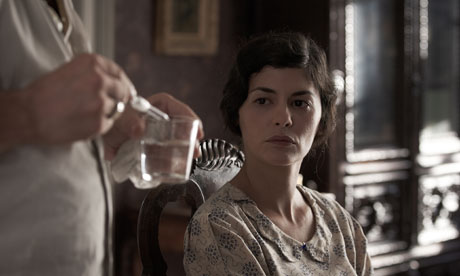
Audrey Tautou: 'There is no room for poetry in Thérèse's world'
The French actor tells Catherine Shoard why she swerved away from sweetness to play a gritty, troubled heiress in the 1920s

Audrey Tautou plays against type in her new film Thérèse Desqueyroux
Meeting Room F in the basement of Toronto's Hyatt Regency hotel has no windows. It has coffee and cookies and the groggy chuckle of an extractor fan. It is 11am at the fag-end of last autumn's film festival. In the corner is a whiteboard in search of a mantra, and a big bin.
And then suddenly Audrey Tautou, too: nose to knees in red satin, eyes like Minstrels, skin like milk. She could be a hologram, a creature from another world – specifically, Cannes, where the film she's talking about today first premiered and where, earlier this year, she hosted the festival´s opening and closing ceremonies with perfect grace and maximum gamine.
Yet Tautou is not a person to feel out of place. Rather, she is a fish out of water who changes the temperature of whatever pond she's in. Questions are asked in English; she responds, through the translator, in French. The arms-length sense of her responses cannot completely be put down to this filtration.
No, she says, there was nothing in particular that made her and the director Claude Miller compatible, other than that they were. "I think that when you have that really strong desire to work with someone it's because, instinctively, you feel you have a certain kinship." Yes, his death a month after finishing the film has added to her passion to promote it. "I know how much he wanted people to see it." She blinks: sweetly fierce, impressively French.
The film is Thérèse Desqueyroux, a strict, rather brilliant chamber piece in which she plays a minted heiress in the 1920s, destined from childhood to shack up with boring Bernard (Gilles Lellouche), brother of her childhood pal Anne, and in line to inherit his own whopping estate. Together their families will have claim over a fair chunk of France, mostly smothered in pine trees. But Thérèse's apparent conservatism, especially in the face of Anne's fling with an unsuitably Jewish hottie, masks a desire for a life less patriarchal. So she starts adding a splash of arsenic to Bernard's nightcap.
The François Mauriac novel on which the film is based unfurls flashback-style; Miller dismantled the architecture and made it linear. "It makes you think, it destabilises you," says Tautou. "What is mysterious and moving about the film is that it asks questions but doesn't provide answers."
Presenting the chronology in a straightforward way adds to a sense of easeful sin: as Anne slips into sex, so Thérèse slides into crime. "She says she's in a tunnel with no end. For her, this is a legitimate defence. She doesn't see any other solution to this imprisonment. Before shooting, I asked myself at what point she became morally culpable. Bernard is no monster. I asked Claude and he said: 'No, no, she does not feel guilty. She has pride in herself. No pity for the stupid, please.'" Tautou herself chips in as the translator stops, to strengthen the sentiment. "For idiots," she smiles.
It is 12 years since Amélie, still the role with which she is most associated – despite a raft of dramas and comedies in France, and playing the direct descendant of Christ in The Da Vinci Code. Thérèse Desqueyroux is a firm swerve away from sweetness: bitter and gritty, puckered and troubled, almost until the very final shot. In the flesh Tautou is all poise, but the sympathy she feels for her character runs deep. If she offered you a coffee, you might think twice before knocking it back.
Tautou quashes the notion it's a time-specific tale. Society continues to compel people into unhappy marriages, she says, even in the west. "In certain environments young adults can't choose their lives because of family pressure. In the bourgeoisie there is still a sense you will marry within that milieu."
Perhaps all marriages involve some element of imprisonment? Tautou stonewalls. Thérèse initially sees marriage as a way out of mental anguish, after all. "She says: 'My head is too full of ideas, and I want marriage to stop that.' She feels that the virtue of marriage is to discipline her. She is trying to convince herself it is a salvation. What she wants is the freedom to be able to express herself."
Next up: another classic of French literature – Boris Vian's Foam of the Daze, adapted by Michel Gondry as Mood Indigo. Tautou is Chloé, who falls ill when a lily begins to bloom in her chest. So, a woman ruled by nature rather than one whose identity is predicated on land ownership. "It's true that in Michel's film there is an encroaching of nature on everything; the disease is taking over her body. With Claude, it's a much more materialistic view. There is no room for poetry in Thérèse's world."
Yes, it's curious that a film in which the environment is so crucial presents it so pragmatically. "It's just a sign of their wealth. Claude chose to film it that way; he wanted to show the rigidity and austerity of the pine forests, also perhaps as a metaphor for what's hiding under the bark." She fixes me with a bright look. "Everything has meanings. Nothing is said without intent." Later, I look up what does lie beneath the bark of a pine tree. It is, it turns out, a potent antioxidant, a chemical that deactivates free radicals. Just try it, trees. Just try it.



No comments:
Post a Comment